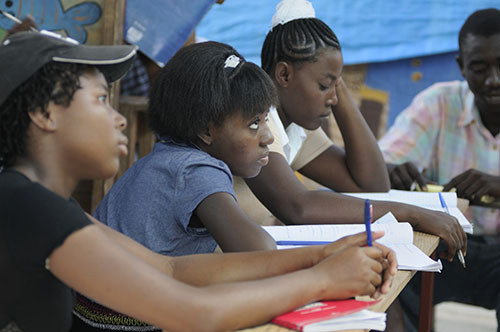
“Low Performing Students: Why They Fail and How to Help Them Succeed” is a new analysis of previously published PISA data which discusses the factors affecting students’ low performance on PISA together with recommendations for what countries can do to help their students.
In my interview with Andreas Schleicher, Διευθυντής Εκπαίδευσης και Δεξιοτήτων, Special Advisor on Education Policy to the Secretary-General at the Organization for Economic Co-operation and Development, we discussed the cycle of poor student performance in at-risk communities, the key characteristics of schools that affect the level of performance, how government policy can support students, and the relevance of the PISA test in a changing education environment.
Ανδρέας: What surprised you most about the Low-Performing Students: Why They Fall Behind and How to Help Them Succeed report and why?
I was surprised how little the economic and social background of schools and countries contributes to the risk of poor performance, and how much school policy can really do about it. And you find that reflected in the progress which some of those countries that had made this a priority have achieved in reducing the share of poor performers. Για παράδειγμα, Βραζιλία, Γερμανία, Ιταλία, Μεξικό, Πολωνία, Πορτογαλία, Tunisia and Turkey significantly reduced the share of low performers in math between 2003 και 2012. What do these countries have in common? Not very much; as a group, they are about as socio-economically and culturally diverse as can be. But therein lies the lesson: all countries can improve their students’ εκτέλεση, given the right policies and the will to implement them.

How destructive is the cycle of poor student performance in at-risk communities? How does the cycle of intergenerational low-achievement affect a large country (Η.Π.Α. για παράδειγμα) as a whole?
Poor performance at school has long-term consequences that are hard to compensate, both for individuals and nations. Students who perform poorly at age 15 face a high risk of dropping out of school altogether. And when a large share of the population lacks basic skills, a country’s long-term economic growth is severely compromised. Όντως, η οικονομική παραγωγή που χάνεται λόγω της κακής εκπαίδευσης πολιτικών και πρακτικών αφήνει πολλές χώρες σε ό, τι συνιστά μια μόνιμη κατάσταση της οικονομικής ύφεσης – και ένα που μπορεί να είναι μεγαλύτερη και βαθύτερη από αυτή που προέκυψε από την οικονομική κρίση στις αρχές της νέας χιλιετίας. Think about the United States: If all 15-year-old Americans would achieve at least the most basic level of PISA performance, the US economy could gain an additional 27 trillion US$ over the working life of these students. Φυσικά, one can always question whether it makes sense to establish global benchmarks for low performance in a highly diverse set of countries that place very different demands on the skills of individuals. But this report sets the bar at a very basic level of performance that we should expect all 21st century youths to attain. In reading, it is the threshold where students more from being able to technically read towards using reading for learning. In mathematics, it involves a basic understanding of fundamental mathematical concepts and operations. And it is interesting that educational policy and practice is a much more powerful predictor for the share of students who are missing this bar than income per capita.
We also need to recognize that poor performance at age 15 is not the result of any single risk factor, but rather of a combination and accumulation of various barriers and disadvantages that affect students throughout their lives. Who is most likely to be a low performer in mathematics? Κατά μέσο όρο στις χώρες του ΟΟΣΑ, a socio-economically disadvantaged girl who lives in a single-parent family in a rural area, has an immigrant background, speaks a different language at home from the language of instruction, had not attended pre-primary school, had repeated a grade and is enrolled in a vocational track, has a 83% probability of being a low performer. While these background factors can affect all students, among low performers the combination of risk factors is much more detrimental to disadvantaged than to advantaged students. Πράγματι, all of the demographic characteristics considered in our report, as well as the lack of pre-primary education, increase the probability of low performance by a larger margin among disadvantaged than among advantaged students, κατά μέσο όρο στις χώρες του ΟΟΣΑ. Σε αντίθεση, only repeating a grade or enrollment in a vocational track has greater penalties for advantaged students. Με άλλα λόγια,, disadvantaged students tend not only to be encumbered with more risk factors, but those risk factors have a stronger impact on these students’ εκτέλεση.

Education Reform has become more focused on designing curricula that can best serve the trends and challenges facing our world. Given this critical big picture debate, how does the PISA test remain relevant?
That is precisely what PISA is about. The PISA test is less concerned with whether students can reproduce specific subject matter content, but more whether they can creatively use, apply and extrapolate from what they know. That’s because the modern world no longer rewards us just for what we know – Google knows everything – but for what we can do with what we know.
How important are the characteristics of schools, συμπεριλαμβανομένων των εκπαιδευτικών, resources and student body composition, in affecting the incidence of low-performing students?
Είναι σημαντικό, students attending schools where teachers are more supportive and have better morale are less likely to be low performers, while students whose teachers have low expectations for them and are absent more often are more likely to be low performers in mathematics, even after accounting for the socio-economic status of students and schools.
Εξάλλου, in schools with larger concentrations of low performers, the quality of educational resources is lower, and the incidence of teacher shortage is higher, κατά μέσο όρο στις χώρες του ΟΟΣΑ, even after accounting for students’ και σχολεία’ socio-economic status. In countries and economies where educational resources are distributed more equitably across schools, there is less incidence of low performance in mathematics, and a larger share of top performers, even when comparing school systems whose educational resources are of similar quality.
The report also shows that the degree to which advantaged and disadvantaged students attend the same school (της κοινωνικής ένταξης) is more strongly related to smaller proportions of low performers in a school system than to larger proportions of top performers. These findings suggest that systems that distribute both educational resources and students more equitably across schools might benefit low performers without undermining better-performing students.

What are the key policy proposals that the OECD strongly recommends be adopted by countries with a high level of low performing students?
The first step for policy makers is to make tackling low performance a priority in their education policy agenda. Because the profile of low performers varies significantly across countries, it is essential to identify low performers and develop multi-pronged, tailored approaches. Tackling low performance requires stepping in as early as possible. That means, μεταξύ άλλων,, offering pre-primary education opportunities and remedial support in early grades. Providing schools with language and/or psycho-social support (π.χ.. ψυχολόγους, μέντορες, counsellors) for struggling students and their families, offering extracurricular activities, and training teachers to work with these students can also help. Φοιτητές, πάρα πολύ, can help themselves make the most of their schooling – and their own potential – by showing up at school – on time – and investing their best efforts in learning.
(All photos are courtesy of Shutterstock.com)

C. M. Rubin και ο Ανδρέας Schleicher
Έλα μαζί μου και παγκοσμίως γνωστή ηγέτες σκέψης συμπεριλαμβανομένου του Sir Michael Barber (Ηνωμένο Βασίλειο), Ο Δρ. Michael Block (ΗΠΑ), Ο Δρ. Leon Botstein (ΗΠΑ), Καθηγητής Clay Christensen (ΗΠΑ), Ο Δρ. Linda Ντάρλινγκ-Hammond (ΗΠΑ), Ο Δρ. MadhavChavan (Ινδία), Ο καθηγητής Michael Fullan (Καναδάς), Ο καθηγητής Howard Gardner (ΗΠΑ), Ο καθηγητής Andy Hargreaves (ΗΠΑ), Ο καθηγητής Yvonne Hellman (Η Ολλανδία), Ο καθηγητής Kristin Helstad (Νορβηγία), Jean Hendrickson (ΗΠΑ), Καθηγητής Rose Hipkins (Νέα Ζηλανδία), Καθηγητής Cornelia Hoogland (Καναδάς), Αξιότιμο Jeff Johnson (Καναδάς), Η κ. Chantal Kaufmann (Βέλγιο), Ο Δρ. EijaKauppinen (Φινλανδία), Υφυπουργός TapioKosunen (Φινλανδία), Ο καθηγητής Dominique Λαφοντέν (Βέλγιο), Ο καθηγητής Hugh Lauder (Ηνωμένο Βασίλειο), Lord Ken Macdonald (Ηνωμένο Βασίλειο), Ο καθηγητής Geoff Masters (Αυστραλία), Καθηγητής Barry McGaw (Αυστραλία), Shiv Nadar (Ινδία), Καθηγητής R. Natarajan (Ινδία), Ο Δρ. PAK NG (Σιγκαπούρη), Ο Δρ. Denise Πάπα (ΗΠΑ), Sridhar Rajagopalan (Ινδία), Ο Δρ. Diane Ravitch (ΗΠΑ), Richard Wilson Riley (ΗΠΑ), Sir Ken Robinson (Ηνωμένο Βασίλειο), Καθηγητής Pasi Sahlberg (Φινλανδία), Καθηγητής Manabu Sato (Ιαπωνία), Andreas Schleicher (PISA, ΟΟΣΑ), Ο Δρ. Anthony Seldon (Ηνωμένο Βασίλειο), Ο Δρ. David Shaffer (ΗΠΑ), Ο Δρ. Kirsten Μοναδική Are (Νορβηγία), Στήβεν Spahn (ΗΠΑ), Yves Theze (LyceeFrancais ΗΠΑ), Ο καθηγητής Charles Ungerleider (Καναδάς), Ο καθηγητής Tony Wagner (ΗΠΑ), Sir David Watson (Ηνωμένο Βασίλειο), Καθηγητής Dylan Γουίλιαμ (Ηνωμένο Βασίλειο), Ο Δρ. Mark Wormald (Ηνωμένο Βασίλειο), Ο καθηγητής Theo Wubbels (Η Ολλανδία), Ο καθηγητής Michael Young (Ηνωμένο Βασίλειο), και ο καθηγητής Minxuan Zhang (Κίνα) καθώς εξερευνούν τα μεγάλα ζητήματα της εκπαίδευσης εικόνα που όλα τα έθνη αντιμετωπίζουν σήμερα.
Η Παγκόσμια αναζήτηση για την Εκπαίδευση της Κοινότητας Σελίδα
C. M. Rubin είναι ο συγγραφέας των δύο πολυδιαβασμένα online σειρά για την οποία έλαβε ένα 2011 Βραβείο Upton Sinclair, “Η Σφαιρική Αναζήτηση για Εκπαίδευση” και “Πώς θα μας Διαβάστε?” Είναι επίσης ο συγγραφέας του μπεστ σέλερ τρία βιβλία, Συμπεριλαμβανομένων Η Ρεάλ Αλίκη στη Χώρα των Θαυμάτων, Είναι ο εκδότης του CMRubinWorld, και είναι ένα Ίδρυμα Fellow δι'υπερήχων.






Πρόσφατα σχόλια